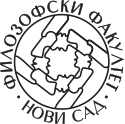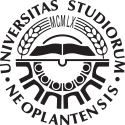15FD1 - Philosophical Methodology
| Course specification | ||||
|---|---|---|---|---|
| Course title | Philosophical Methodology | |||
| Acronym | 15FD1 | |||
| Study programme | Philosophy | |||
| Module | ||||
| Type of study | third degree doctoral academic studies | |||
| Lecturer (for classes) | ||||
| Lecturer/Associate (for practice) | ||||
| Lecturer/Associate (for OTC) | ||||
| ESPB | 10.0 | Status | ||
| Condition | No additional requirements. | Oblik uslovljenosti | ||
| The goal | The main goal of the course ist that the students systematize the methodological knowledge acquired during their bachelor studies and know how to combine philosophical methods with types of philosophical thinking. | |||
| The outcome | The students are able to compare several philosophical methods and estimate which methodical approach is suitable to solve a particular problem. | |||
| Contents | ||||
| Contents of lectures | General and philosophical methodology – similarities and differences. The concept of method in philosophical sense. The history of methodological thinking in philosophy. Analytic method (Aristotle, scholastics, positivism, analytical philosophy). Transcendental-critical method (Kant, Fichte, neocantians, Peirce). Dialectic method (Plato, Schelling, Hegel, Marx, Critical Theory). Phenomenological method (Husserl, Heidegger, Fink). Hermeneutical method (Schleiermacher, Dilthey, Heidegger, Gadamer). Methods in contemporary philosophy (constructivistic, (post)structuralistic method, (anti)method of deconstruction). Pluralism of methods and the concept of metaphilosophy. | |||
| Contents of exercises | Specifying and disussing the topic of the seminar paper | |||
| Literature | ||||
| ||||
| Number of hours per week during the semester/trimester/year | ||||
| Lectures | Exercises | OTC | Study and Research | Other classes |
| 0 | 4 | |||
| Methods of teaching | Individual consultations, discussion of the preliminary versions of the seminar paper | |||
| Knowledge score (maximum points 100) | ||||
| Pre obligations | Points | Final exam | Points | |
| Activites during lectures | 20 | Test paper | ||
| Practical lessons | Oral examination | 50 | ||
| Projects | ||||
| Colloquia | ||||
| Seminars | 30 | |||

